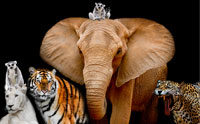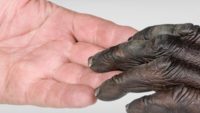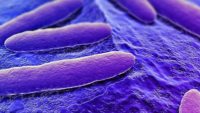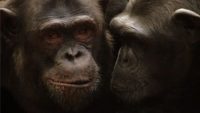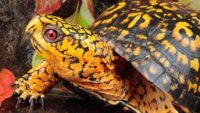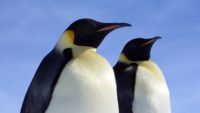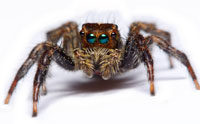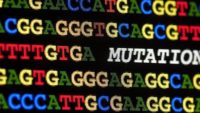These exquisite fliers have an incredible ability to appear stationary to their target. …read more Read more here: creation.com
Some mammals have an appendix connected to their cecum—the first section of the large intestine—but others don’t. How and when did that once-mysterious organ originate? More… …read more Read more here: icr.org
Paleontologists struggle to definitively answer the conundrum of their origins and the fossil record still says no to evolution. …read more Read more here: creation.com
By Jeffrey P. Tomkins Taken together, genomic data for both the alleged fusion and cryptic centromere sites refute the concept of fusion in a human-chimpanzee common ancestor. …read more Read more here: AIG Daily
By Dr. Don DeYoung Try standing barefoot on a pile of snow and see how long you last. Ducks do it all the time and aren’t bothered. How is this possible? …read more Read more here: AIG Daily
By Dr. David Menton This amazing organ quietly serves several invaluable roles in our blood system, keeping our bodies healthy. …read more Read more here: AIG Daily
How reliable are the dating methods that say living trees are thousands of years old? …read more Read more here: creation.com
A Chinese famine was so severe that 35 million lives perished between 1958 to 1962 due to the state’s agricultural mistakes. Interestingly, this tragedy highlights an unseen biological relationship between organisms and their environment over multiple generations. More… …read more Read more here: icr.org
By Dr. Alan Gillen The emphasis of this article is to explain some of the “very good” design and purpose of Staphylococci and other good, beneficial bacteria of the nose. …read more Read more here: AIG Daily
By Dr. Elizabeth Mitchell Though monkeys can’t imitate human language despite speech-ready vocal tracts because of their brains’ wiring, their versatile alarm calls meet their needs. …read more Read more here: AIG Daily
“This is the last in a series of articles dealing with 15 questions posed to evolutionists. There is a link to the original article below (read it first) as well as the parts 1 and 2 rebuttal articles to all the evolution supporters criticisms of the original article. An excellent and thoughtful read.” Admin Responses to our 15 Questions: part 1 Responses to our 15 Questions: part 2 Here we continue presenting the attempted answers to our 15 Questions for Evolutionists. We’ve compiled many of the answers that we’ve received to date (paraphrased to cover as many [More]
Have evolutionists finally found proof that dinosaurs had feathers? If so, what does it mean? …read more Read more here: creation.com
A tenet of creationist theory maintains that creatures are designed for robust speciation. Although they cannot change into fundamentally different kinds, creatures can rapidly express a wide diversity of traits to fit changing environments. “Fast evolution affects everyone, everywhere” is one headline from the theme of the Royal Society’s life science journal in January, 2017. But its content further bolsters creationist theory. More… …read more Read more here: icr.org
By Dr. Don DeYoung Your ears are delicate instruments, fine-tuned to hear a wide range of noises. What keeps them from being ripped apart by violent waves of loud vibrations? …read more Read more here: AIG Daily
By Dr. Gordon Wilson Eastern box turtles can literally be “frozen alive” and emerge unharmed. …read more Read more here: AIG Daily
Human pregnancies, on average, last 38-40 weeks—approximately nine months. This makes potential genetic change in the human race relatively slow. Not so with Drosophila melanogaster: the fruit fly. If you were to make a short list of creatures that could serve as examples to prove neo-Darwinian evolution to be a legitimate theory, the common fruit fly would probably be on the list.1 Female flies can lay about 500 eggs in their lifetime, and each fly can grow from egg to adult in about a week2—translating to about 50 generations per year. After only a century of testing, scientists have been [More]
Neo-Darwinian evolution, the popular version of evolution today, asserts that mutations provide the mechanism for the change required to evolve a single-celled organism into a human over time. Upon examination of the evidence, however, it is clear that mutations cannot provide the genetic information required for such change.1 If mutations cannot provide the mechanism for the change required by neo-Darwinian evolution, what can? A recent area of study that some evolutionists are hopeful will provide an answer to that question is epigenetics.2 Epigenetics is the term used to describe the mechanism whereby genetic traits are inherited—passed on to offspring—not from [More]
The notion that petrification processes take thousands of years blown out of the water in a matter of weeks. …read more Read more here: creation.com
THE HEAVENS DECLARE: Additional proof of creation: MetamorphosisExclusive: David Rives notes complex process could not have ‘happened’ through trial and error Watch: Additional proof of creation: Metamorphosis
THE HEAVENS DECLARE: The 1 definition that defies evolutionExclusive: David Rives illustrates blood-clotting ‘cascade’ as evidence for the Creator’s hand Watch: The 1 definition that defies evolution
By Melinda Christian Emperor penguins are among the world’s most recognizable and well-loved birds. …read more Read more here: AIG Daily
“Evolutionists like to tell us that such complex systems like this came about by random chance, yeah right.” Admin By Heather Callaghan By Brianna Acuesta Trees protect each other, sometimes even more than humans do. Longtime forest ranger in Germany, Peter Wohlleben, has been studying the forest since he first decided to become a… …read more Read more here: Natural Blaze
What does the recently unveiled Amazon Go store have to do with several new studies detailing how flies find water or how tiny roundworms can “taste light?” The “world’s most advanced shopping technology” that links the cutting-edge Amazon Go store to its customers depends on the same vital element linking roundworms and spiders to their environments: a sensor. More… …read more Read more here: icr.org
Some evolutionists insist they observe evolution happening all around us while others say it happens too slowly to be able to observe. How can it be both? …read more Read more here: creation.com
By Devon Spencer, DVM In the Dog Spies blog, Scientific American highlighted a recent study that starts to answer some questions about a new scent assessment for dogs. …read more Read more here: AIG Daily
Despite evidence to the contrary, evolutionists continue to offer up random mutations as an explanation of how life developed. …read more Read more here: creation.com
By Dr. Elizabeth Mitchell If we share a common ancestor with a chimpanzee, as evolutionists confidently maintain, then how did our brains leap so far ahead in size and capability? …read more Read more here: AIG Daily






















